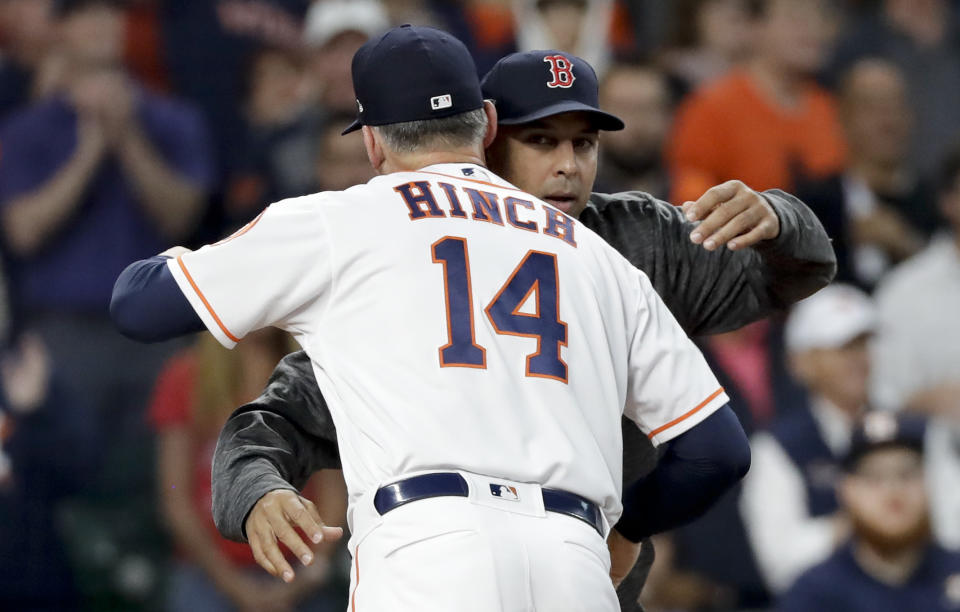MLB parsing possible sign-stealing penalties the honorable thing to do
If Major League Baseball concludes the Houston Astros electronically stole signs in 2017 and beyond, it intends to bring penalties that both punish the Astros and warn those considering similar methods, along with those who have not yet been exposed by a vengeful former employee.
What comes of the investigation will be the current (and possibly future) Astros’ to bear. Common sense has the franchise at risk of losing draft picks and money, and the individuals involved subject to fines, suspensions or worse. At stake is all the Astros have built in Houston. Their reputations will remain.
Commissioner Rob Manfred’s department of investigations is conducting interviews. More remain. Perhaps many more. An insinuation pertaining to a single season has broadened to at least three. The investigation will follow the paths that reveal themselves in the course of those interviews, and so the list of potential subjects grows and further reveals a prickly element to possible sanctions.
For it would be a relatively simple task to punish the men who continue to wear the Astros colors, who oversaw or were charged with overseeing the daily operations of a baseball team and then the baseball games that have come under scrutiny.
Perhaps not as simple is to consider those who may have played a part in those illegalities and are no longer part of the organization, but would now — a year or two or three later — benefit from a cowed, less hearty and more vulnerable Houston Astros.
Manfred has not indicated if sanctions — if merited — would be limited to Astros leadership, from owner Jim Crane to general manager Jeff Luhnow to manager A.J. Hinch. If former Astro Mike Fiers’ recollections were accurate, and if there were evidence the illicit sign-stealing leaked into subsequent seasons, then three coaching staffs and many dozens of players might also be implicated.
So what of those employed by the club in 2017 or thereafter, particularly those in positions to participate in, benefit from or shut down a system that allegedly aided in the club’s first World Series championship, who have since left the team?
Men such as 2017 bench coach Alex Cora, the current Boston Red Sox manager. Craig Bjornson, the bullpen coach for those Astros, serves today as Cora’s bullpen coach in Boston.

And Dave Hudgens, hitting coach for the Astros in 2017 and current bench coach for the Toronto Blue Jays.
And Carlos Beltran, one of 46 players for the Astros in 2017, and now the manager of the New York Mets.
Maybe, maybe, maybe … they were compelled to comply. They showed up, took orders, followed directions and did their jobs as dictated. Maybe it ate at them. Maybe they view that World Series season through the same narrow-eyed visage as the rest of the game has come to consider it. The investigation will tell, near as it can.
Meanwhile, in the event of harsh penalties levied against the Astros, and Manfred said Thursday, “Our clubs, all 30 of them, recognize that the integrity of the competition on the field is crucial to what we do. … There is wide support across the industry for the idea that when we have a problem in this area, there should be firm, serious disciplinary action,” then what of those allegedly complicit who, as employees of other clubs, might not otherwise feel the burden of that action?
If the Astros — in the event they are found guilty, penalized and therefore unable to sustain the momentum that is three consecutive AL West titles, three 101-plus win seasons and two World Series appearances — are diminished as a result of their past conduct, should Cora, as a Red Sox employee, benefit? Should Hudgens, as a Blue Jay?
How does one gather up all the front office employees, coaches and players who once made it their business to know what pitches were coming across so many games, who since have scattered across the league, and assess that damage — that culpability — properly and fairly? How does one parse their roles in this?
Mike Elias, general manager of the Baltimore Orioles, was assistant general manager of the Astros in 2017. In the event Luhnow is disciplined for MLB’s version of lack of institutional control — he is in charge of baseball operations, and illegally stealing signs is most certainly a baseball operation — what does Manfred do with past and present Astros who may have been aware of the alleged deceit?
Would it be enough to simply levy fines and make the coming years for the Astros more difficult than they otherwise would be?
And therefore make life rosier for the Red Sox, Blue Jays and Orioles, among others, by virtue of having one fewer behemoth in the league, at least temporarily.
Perhaps, even likely, it would be too big of a job to chase down every bit player in what looks like a shameful era, to mete out suitable justice, to honor what’s left of a broken code, to determine who knew what and when, to ensure no one who conspired to make the game less believable is rewarded. There would be too many paths to follow.
On the other hand, that effort might just be worth it. It might be the only honorable thing to do.
More from Yahoo Sports:

